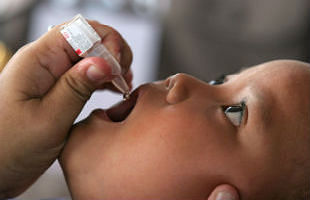Bangladesh polio free
Bangladesh polio free

Bangladesh along with 10 other countries of WHO South-East Asia Region was certified polio-free today by an independent commission under the WHO certification process.
WHO South-East Asia Region is home to a quarter of the world’s population. This is the fourth of six WHO Regions to be certified, marking an important step towards global polio eradication. With this step, 80% of the world’s population now lives in certified polio-free regions according to a WHO press release.
WHO’s South-East Asia Region comprises of the following 11 Member States: Bangladesh, Bhutan, Democratic People’s Republic of Korea, India, Indonesia, Maldives, Myanmar, Nepal, Sri Lanka, Thailand and Timor-Leste.
An independent panel of 11 experts in public health, epidemiology, virology, clinical medicine and related specialties constituting the South-East Asia Regional Certification Commission for Polio Eradication (SEA-RCCPE) met for two days to review evidence from countries before reaching the decision that all 11 countries of the Region are now polio-free and have met the requirements for certification.
Before a Region can be certified polio-free, several conditions must be satisfied such as: at least three years of zero confirmed cases due to indigenous wild poliovirus; excellent laboratory-based surveillance for poliovirus; demonstrated capacity to detect, report, and respond to imported cases of poliomyelitis; and assurance of safe containment of polioviruses in laboratories (introduced since 2000).
“This is a momentous victory for the millions of health workers who have worked with governments, nongovernmental organizations, civil society and international partners to eradicate polio from the Region. It is a sign of what we can bequeath our children when we work together,” said Dr Poonam Khetrapal Singh, Regional Director for the WHO South-East Asia Region.
Polio eradication programmes, through their networks and knowledge in reaching the ‘unreached’, have strengthened the delivery of health services to the most vulnerable communities.
Certification of the Region comes as countries prepare for the introduction of inactivated polio vaccine (IPV) in routine immunization as part of the eventual phasing out of oral polio vaccines (OPV). More than 120 countries currently use only OPV. These countries will introduce a dose of IPV by the end of 2015 as part of their commitment to the global polio endgame plan which aims to ensure a polio-free world by 2018.
While celebrating the historic achievement, the WHO Regional Director also sounded a word of caution to maintain high vigilance against importation of polio.
“Until polio is globally eradicated, all countries are at risk and the Region’s polio-free status remains fragile. High immunization coverage can prevent an imported virus from finding an underimmunized, susceptible population. A sensitive surveillance system, able to quickly detect and identify any importation and guide a programmatic response, is critical,” she added.